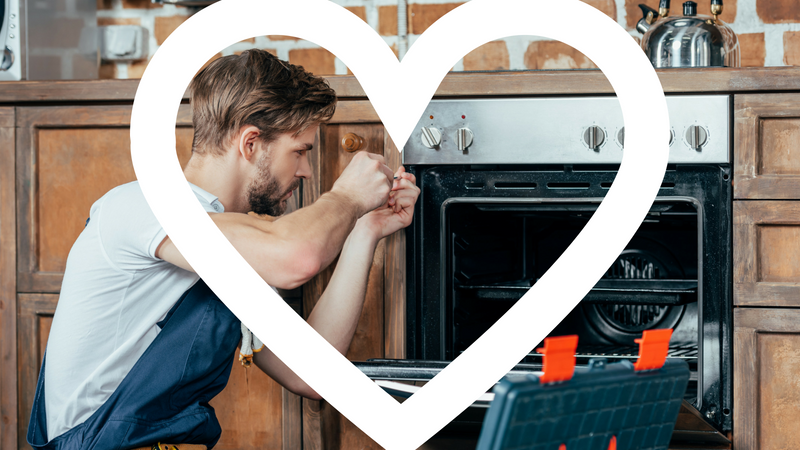Love Is a Verb, Not a Noun: Seeing Everyday Love
I married well. Really well. Unexpectedly well, based on my prior relationship history. One of the reasons our relationship works so well is that I learned a valuable lesson from my parents: Love is a verb, not a noun.
My parents never verbalized this vital point; they showed it in how they responded to each other. My mother stayed home with us kids, making my dad responsible for supporting all seven of us.
As a kid myself, I didn’t appreciate that this meant the load on my father’s shoulders or the responsibility he felt were tremendous. I didn’t understand what “work” involved. To me, it seemed like school. You went, you came home. You did your chores. In my mind, Dad just worked a little longer than I was in school, and I had homework. No big deal. He didn’t even have report cards to deal with.
Love is a verb, not a noun.
Whenever one of my siblings or I would make a comment about Dad taking an extra day off work or comment on how we thought he should help Mom more around the house (and how that meant we wouldn’t have to work so much, either), Mom sent a clear message:
He had a role, a job, in the family. So did Mom, as a homemaker and full-time mom. They had agreed on their responsibilities and took on equal shares of the work.
It would have been easy, then, for each to take the other for granted. After all, Dad was just doing his job when he went to work. It was the same for Mom: staying up with sick kids was just what she did. “I’m just doing my job, ma’am.”
I know plenty of couples who operate in this mode, regardless of how their marital, family and home responsibilities are divided. While each may recognize that the other is carrying their load, it also goes unacknowledged.
And when our efforts go unacknowledged, we can feel invisible. Unloved. We forget why we are bothering to put in the effort if no one notices it.
I don’t think it was intentional, but my parents demonstrated a different dynamic to us. Most nights after dinner, Dad would thank Mom for cooking for us. “It was really great,” he would say, or tell us kids how lucky we were to have such a good cook for a mom. It didn’t matter that we didn’t get it or appreciate it; he made a point of expressing it to her.
In the same way, Mom would tell us all the different ways that Dad showed his love for our family. “Your father works hard to support all of us. Without him, we wouldn’t be able to have the things we have or go on vacations, or do other fun things.”
When our efforts go unacknowledged, we can feel invisible. Unloved. We forget why we are bothering to put in the effort if no one notices it.
Sometimes, when I was in the car with Mom, the conversation would get serious. We’d talk about dating relationships, and she’d share some of her wisdom with me. I’d have guys who would make the grand gesture for me, and then let me down on the stuff that really mattered. “Watch what they do, Teresa,” she’d tell me. “Their actions tell you how they really feel.”
Somehow, in the middle of this, my parents taught me a lesson that I under-appreciated at the time, but that is a foundation to my marriage today: Love is a verb.
When someone loves us, they make a point of showing up for us. My husband will work an 80-hour week and skip watching the baseball game to prioritize weeding the backyard because he knows I enjoy looking at it. He’s earned his rest and his sleep, but he chooses instead to do something he knows will bring me joy.
If I start to feel neglected because he’s working a lot of hours, it’s because I haven’t been looking at the small things he does:
He works — and works hard — so I can stay home. That’s an act of love.
He bought and installed new USB-outlets for me so that I could plug the USB charger directly into the outlet because he saw me juggling plugs and cords.That’s an act of love.
He observed me looking for solutions to get more light into my office, and decided to install recessed lighting to fix it for me. That’s love.
He fixes the cars and checks the security cameras because that’s how he keeps his family safe. That’s love.
“Watch what they do, Teresa,” she’d tell me. “Their actions tell you how they really feel.”
I’ve learned not just to see it, but acknowledge it. “Thank you, honey, for taking the trash out for me.” I try to make it a point to look for the smallest gestures and acknowledge them — even when he’s just doing his “job.”
He inspires me to be more generous in my actions back. We’re headed on vacation soon; guess who drove out of their way to get his favorite Mexican soda? He’ll appreciate the gift, sure, but he’ll appreciate the action more. That’s love. When I fold his laundry and set it where he likes it, he notices and thanks me. I don’t just fold his laundry; I fold his laundry the way he likes it. Because that’s important to him. It’s a small way I can show I love and respect him.
It happens in fights, too. We’ve never said “no personal attacks” in our arguments, but neither of us hits below the belt. Why? Because love includes conflict, but not inflicting pain. We can honor our marriage and our love for each other even in the way we fight, another lesson I got from my parents.
Teaching me to pay attention to these small acts of love is one of the best gifts my parents could have given me.
We may not be big on saying “I love you,” or doing the whole flowers-and-chocolates thing, but I’m OK with that. I get told “I love you” a thousand times a day in the smallest of ways. I only hear it because I look for it.
Love is a verb, not a noun.
What does love look like to you? How do you recognize it in your everyday life?
Looking for daily inspiration and community? Join our warm and supportive Facebook group!









